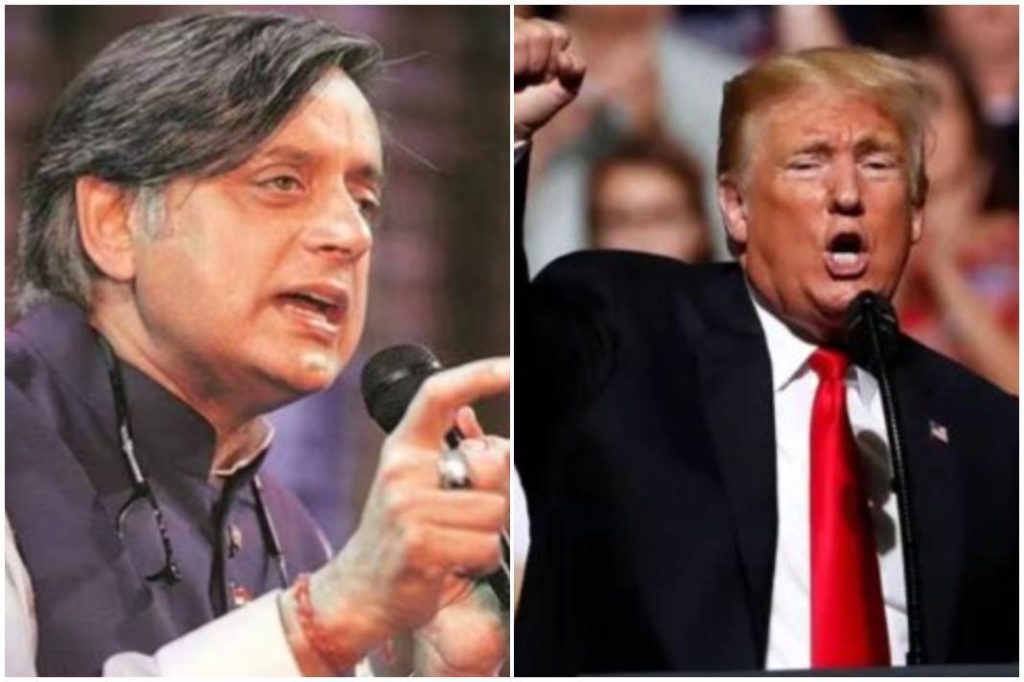
Shashi Tharoor shares 4 reasons why Trump’s ceasefire post on India & Pak was ‘disappointing’
Recently, US President Donald Trump took to social media to call for a ceasefire between India and Pakistan. While the move was seen as an attempt to ease tensions between the two nuclear-armed neighbors, Congress MP Shashi Tharoor was not impressed. In a series of tweets, Tharoor shared four reasons why he found Trump’s post “disappointing”. In this blog post, we’ll take a closer look at each of these reasons and analyze why Tharoor’s concerns are valid.
Reason 1: False Equivalence
Tharoor’s first reason for being disappointed with Trump’s post is that it implies a “false equivalence” between the victim and perpetrator. In other words, the tweet equates India and Pakistan as two equal parties in the conflict, rather than recognizing the fact that Pakistan has been consistently supporting terrorism in India and has been the root cause of the tension between the two countries. This, according to Tharoor, is a grossly inaccurate portrayal of the situation.
Tharoor is right to point this out. By implying that both countries are equally responsible for the conflict, Trump’s tweet ignores the fact that Pakistan has been accused of providing safe haven to terrorists and has been involved in a long history of cross-border terrorism in India. This equivalence also ignores the fact that India has been a victim of Pakistan’s aggression and has been forced to respond in self-defense.
Reason 2: Pakistan’s Negotiating Framework
Tharoor’s second reason for being disappointed is that Trump’s tweet offers Pakistan a negotiating framework which it hasn’t earned. In other words, Trump’s call for a ceasefire implies that Pakistan has been playing a constructive role in the conflict, which is far from the truth. Pakistan has been consistently refusing to take concrete action against terrorist groups operating on its soil and has been using the conflict as a smokescreen to divert attention away from its own human rights abuses.
By offering Pakistan a negotiating framework, Trump’s tweet sends a message that Pakistan’s actions are acceptable and that it deserves a seat at the negotiating table. This, according to Tharoor, is a mistake. Pakistan needs to be held accountable for its actions and needs to take concrete steps to dismantle terrorist infrastructure on its soil before it can be considered a legitimate negotiating partner.
Reason 3: Internationalization of the Kashmir Dispute
Tharoor’s third reason for being disappointed is that Trump’s tweet “internationalises” the Kashmir dispute. In other words, the tweet implies that the Kashmir issue is a global problem that needs to be resolved through international mediation. This, according to Tharoor, is a mistake. The Kashmir dispute is a bilateral issue between India and Pakistan and needs to be resolved through direct negotiations between the two countries.
By internationalizing the issue, Trump’s tweet creates the impression that the international community has a stake in the dispute and that India and Pakistan need to take instructions from the outside world. This is a recipe for disaster and creates the potential for outside powers to meddle in the internal affairs of India and Pakistan.
Reason 4: Re-Hyphenation of India and Pakistan
Tharoor’s final reason for being disappointed is that Trump’s tweet “re-hyphenates” India and Pakistan. In other words, the tweet implies that India and Pakistan are still linked in some way, despite the fact that they have been separate countries for over seven decades. This, according to Tharoor, is a mistake. India and Pakistan are two separate countries with their own distinct identities and national interests. They need to be treated as such, rather than being treated as if they are still linked in some way.
By re-hyphenating India and Pakistan, Trump’s tweet creates the impression that the two countries are still connected in some way and that their actions have a direct impact on each other. This is a mistake. India and Pakistan need to be treated as separate countries with their own distinct national interests and identities.
Conclusion
In conclusion, Shashi Tharoor’s four reasons for being disappointed with Trump’s ceasefire post on India and Pakistan are valid concerns. Trump’s tweet implies a false equivalence between the victim and perpetrator, offers Pakistan a negotiating framework which it hasn’t earned, internationalizes the Kashmir dispute, and re-hyphenates India and Pakistan. These are all mistakes that need to be corrected if the US is to play a constructive role in resolving the conflict between India and Pakistan.
As Tharoor pointed out, the US needs to take a more nuanced approach to the conflict, one that recognizes the fact that Pakistan has been consistently supporting terrorism in India and that India has been a victim of Pakistan’s aggression. The US needs to focus on holding Pakistan accountable for its actions and needs to work with India to find a peaceful solution to the conflict.
Sources:






